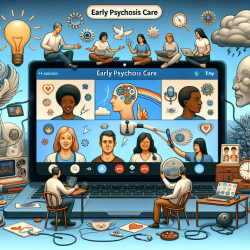Introduction
Topiramate (TPM) is a well-established antiepileptic drug known for its broad-spectrum efficacy in treating partial and generalized seizures. However, its cognitive side effects, particularly on expressive speech and verbal memory, present challenges in pediatric populations, including those undergoing speech therapy. This blog explores how practitioners can use data-driven insights from the research article "Topiramate in the treatment of partial and generalized epilepsy" to improve therapeutic outcomes for children with epilepsy who are also receiving speech therapy.
Understanding Topiramate's Mechanisms
Topiramate's efficacy against various seizure types is attributed to multiple mechanisms, including sodium channel blockade, glutamate receptor inhibition, and enhanced GABA-mediated chloride channel opening. These mechanisms collectively reduce neuronal excitation and enhance inhibition, providing a neuroprotective effect. However, these same mechanisms can lead to cognitive side effects, such as expressive speech difficulties and verbal memory impairments, which are particularly concerning in children.
Data-Driven Strategies for Practitioners
Practitioners can leverage data from the research to tailor speech therapy approaches for children on TPM. Here are some strategies:
- Monitor Cognitive Side Effects: Regularly assess cognitive functions, focusing on verbal memory and expressive language skills. Use standardized cognitive assessments to track changes over time.
- Adjust Therapy Techniques: Incorporate techniques that specifically target expressive language and memory enhancement. Use visual aids and repetitive exercises to reinforce learning.
- Collaborate with Medical Teams: Work closely with neurologists to adjust TPM dosages, aiming for the lowest effective dose to minimize cognitive side effects.
- Educate Families: Inform families about potential cognitive side effects and strategies to support their child's language development at home.
Encouraging Further Research
While the current research provides valuable insights, further studies are needed to explore the long-term cognitive effects of TPM in children and the efficacy of different speech therapy interventions. Practitioners are encouraged to participate in or initiate research projects that examine these aspects, contributing to a more comprehensive understanding of TPM's impact on pediatric speech therapy.
Conclusion
By integrating data-driven insights from the research on TPM, speech therapists can enhance their practice and improve outcomes for children with epilepsy. Tailoring therapy approaches to address cognitive side effects and collaborating with medical professionals are key strategies in achieving optimal results.
To read the original research paper, please follow this link: Topiramate in the treatment of partial and generalized epilepsy.










